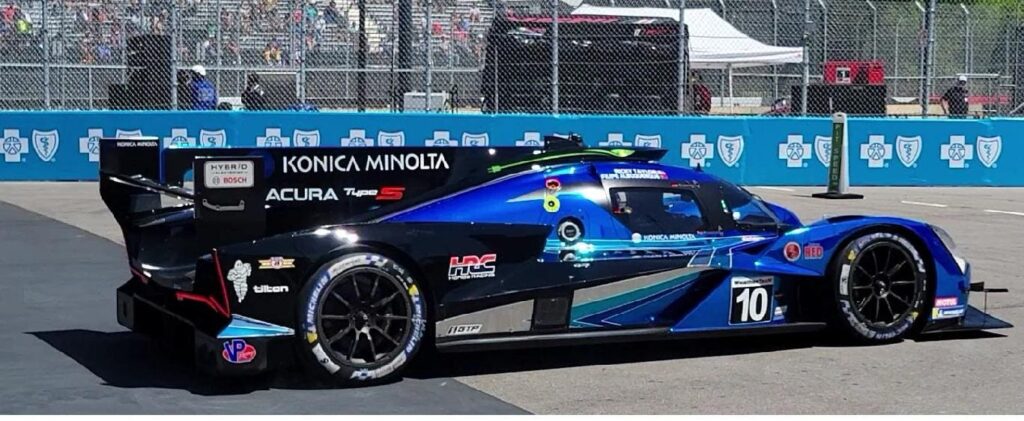Le Mans Daytona Hybrid race car during practice for the 2024 Detroit Grand Prix, May … [+]
On a path through the paddock between the Detroit River and the Motor City's iconic Renaissance Center, the icons of gasoline power make their way onto the downtown track for this weekend's Detroit Grand Prix race.
But these sleek beasts of speed aren't all the same: the bright blue car has tags on its wings, revealing that it's not just liquid fuel that powers its high-performance engines.
The tag has just three words written on it: “Hybrid Electric Bosch,” which means the racer is a Le Mans-Daytona hybrid equipped with a standard hybrid-electric system developed by German automotive technology company Bosch in collaboration with the International Motor Sports Association (IMSA).
The partnership will make the LMDh car the first North American hybrid eligible to compete in Grand Touring Prototype (GTP) class racing.
Bosch Motorsport Director Jacob Bergenski explains to reporters about the Bosch hybrid system being used. … [+]
Amid the hustle and bustle of pre-race practice sessions and other crucial preparations that day, IMSA chiefs and Bosch engineers explained the technical characteristics of Bosch's hybrid system against the backdrop of the event at hand — but in reality, automakers pouring millions of dollars into race cars hope that the technology they use to compete will ultimately make it into showrooms.
“For me it's a laboratory. What we learn here, sometimes we learn from our failures, but especially in a race format when something breaks on the race track, it's like, what did we learn here today, how do we apply that to our next consumer product to make it better on the race track? I think that's why we're doing this, and why the OEMs are doing it,” IMSA Chairman John Doonan said during a media briefing on Bosch's hybrid technology.
A race car pits during a practice day for the 2024 Detroit Grand Prix.
Applying knowledge gained on the race track – tyres, engines, fuel, technology – to street vehicles is a long-standing practice.
For the Bosch hybrid system currently installed in LMDh vehicles, many of the features that increase power, reduce weight, and improve performance could potentially be found in road vehicles.
The tag is attached to the rear wing of the Le Mans Daytona Hybrid race car, which is equipped with a Bosch hybrid system.
“Really, what we're doing on the track is accelerating what that technology looks like on the road,” explains Bosch Motorsport director Jacob Bergenski. “It's a very lightweight hybrid, so it has a very compact little battery. But to get that much power, you basically need to be able to charge it very quickly, and the technology to do that is completely state-of-the-art on the race track right now. That's what really helps us get the efficiency out of this system.”
The advances in hybrid powertrain technology being evaluated by Bosch and IMSA come at a time when consumers who aren't interested or ready to trade in their internal combustion engine vehicles for electric vehicles are becoming open to the sort of compromise that hybrids might offer.
In KPMG's American Perspective Survey, only one in five consumers said they would prefer an electric vehicle, while 43% said they would buy a hybrid if the cost and features were comparable. Traditional internal combustion engine cars came in at 38%.
Indeed, while some industry insiders see hybrids as a stepping stone before jumping into battery-only vehicles, Bosch's director of powertrain solutions argues that advances in hybrid technology could satisfy some consumers' desire for sustainable vehicles.
“Basically, NOX, smog and pollutants are also reduced with hybrid technology,” says Mohammad Fatulai. “In simple terms, it optimizes the operation of the engine and eliminates the area where the engine puts out pipe pollutants. You have got a very powerful system that can boost the torque and power requirements that you need, so you are basically running the engine at a very optimal state.”
Fatulai noted that efficiency improvements also include reducing the size and weight of the battery as well as using silicon carbide chips, and that Bosch plans to start production in the United States by 2026.
In terms of power capability, Bosch's hybrid system could deliver one of the more attractive features of some battery-electric pickup trucks.
“Your car now has a power plant that can power your house,” Fathulai said.
But for certain uses, like commuting to work or running errands, EVs can be a good choice, said Fathurai, who owns one himself.
This weekend, LMDh vehicles, identified by a “hybrid electric Bosch” tag, will compete for victory in a grand prix through the streets of downtown Detroit. The long-term goal is to use what's learned on the track to build a more capable hybrid that can win in the showroom.

